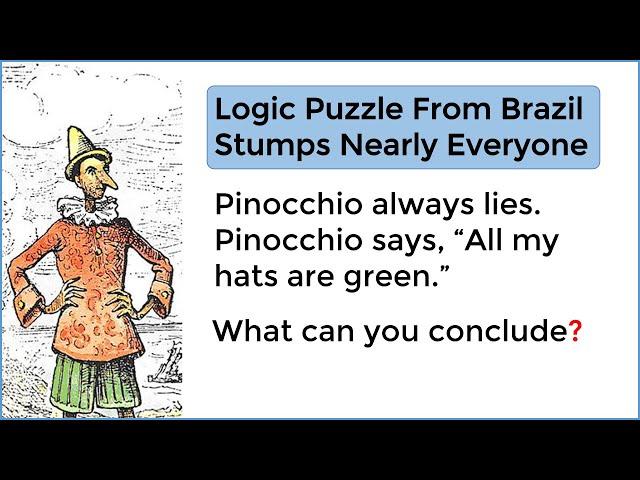Комментарии:

Thanks!
Ответить
I conclude that hats and green don't exist in this world
Ответить
Its the Liar's paradox.
Ответить
So the name Pinocchio is arbitrarily used for this problem? I thought well If his nose didn’t grow he must be telling the truth lol
Ответить
I'm late to this lengthy debate. I answered "C" and I'm sticking with that answer. Here's my reasoning for my solution:
"All my hats are green.", translates to the following without change of meaning or loss of meaning, "I own at least one hat. The color of each is green."
Since we know Pinocchio lies about all things, his stated ownership of any hat or hats is false. He doesn't own any hats at all, so color-application to something non-existent is irrelevant. Someone in the comments made a VERY good observation involving a courtroom example. I forget who made the comment, but it went something like this:
Judge to Defendant: "What can you say about your success in life?"
Defendant to Judge: "All of my businesses have been successful."
After cross-examination and the questioning of many expert witnesses, it's proven without ANY doubt that the Defendant never owned a business. The Judge holds the Defendant in contempt of court. This is the real world. This is not the world of a Math/Logic Olympiad where different rules of operation apply.
I concede that answer "A" is the correct answer for the Math/Logic Olympiad world for the following reasoning:
The sentence, "All my hats are green.", has to be taken IN TOTALITY. You can't break it into sub-components. Because of this, we can't argue about ownership. If you take it in totality, our response to Pinocchio should be, "No they're not because you're a lair. We don't know how many hats you have but they number at least one. You might have one or more green hats. We simply don't know. But, they're not all green. All we can say for sure is that you have at least one hat."
For this Math/Olympiad scenario, "A" is the correct answer because we can't pick apart the sentence regarding the truth or falsehood of actual ownership.
I came to these conclusions after reading the many wonderful arguments given by many other commenters.

I said A, but for a different reason. If he has no hats it's neither true or false if he says they're all green. It's just illogical to put any value onto 'them' (what is them? if they're just not? eh?)
Ответить
Everybody knows Pinocchio has one hat, and it's red. Solved in 1 second. 😉
Ответить
My initial thought was that he has to have at least one hat, of which at least one is not green. Isn't that a way better answer compared to the other options?
Ответить
I find it a bit of a stretch to call this a "logic problem," as the solution ultimately comes down to an arbitrary convention rather than legitimate logical reasoning.
"Vacuous truths" are not an inherent feature of the nature of the universe. It would be useless for me to try to refute such a well-established operational definition, but at the end of the day it's still an arbitrary convention and nothing more.
As a side note, in every attempt to rule out option C that I've seen both in the comments and the video itself, there is an inherent flaw, namely implicit division by 0:
> If Pinocchio has 0 hats and 0 of them are green, then 100% of his hats are green, right? And that means his statement would be true, right? Wrong. A percentage is a ratio, in this case the ratio of "Hats owned by Pinocchio that are green" / "All hats owned by Pinocchio." If he has 0 green hats and 0 total hats, the percentage of green hats is equal to 0/0 which hopefully we can all agree is undefined, NOT defined as 100% like many commenters seem to believe.

I don’t get why you wouldn’t read it as “All my hats are not green” and say E is correct
Ответить
I profoundly disagree %)))
Ответить
Ah, but have we established that this entity is the real Pinocchio?
Ответить
Wow!
I was arguing with you all the way through the video, since he could be lying about having hats, but, when you used the "no mobile phones in the room" example, it suddenly hit me like a sledgehammer 🙂

My first intention was that none of the answers are correct and the logic behind answer (A) makes me cringe.
Ответить
Why am I here, I was just looking for videos about Lies of P
Ответить
First off, was Pinocchio the one to tell this story? Second, did his nose grow while telling it? Need more information.
Ответить
🇧🇷
Ответить
I don't understand the confusion in the comments. "My hats" is not a statement. "ALL (my hats) ARE GREEN" is one, however.
If my lie is "my eyes are green", would you say that I don't have eyes?

You can easily eliminate B, D, and E without even reading them, because A and C are direct contradictions. If there is one correct answer, it must be one of these
Ответить
None of the above would be my answer !
The assumtion states that both sentences are true.
The answer, all hats are green
If the assumtion is wrong!
Pinocchino "sometimes" lies, because if he is honest, he would say so! If he always lies, he wouldn't tell "always", that would be otherwise true.
Therefore "sometimes" with that, the second sentence cannot be verified thus it could be completely and partially true or false.

I disagree
Ответить
Assign variables to hats. Having a hat = 1. If pinocchio owns 1 hat the statement is true because he is saying he has a hat.
The answer is no hats. You can't have a partial truth in the statement.

Wordems is a new tricky world play game you have got to try. Hard asf!
Ответить
You act like if « undecidable » was’nt part of the mathematical language in question. Saying that all mobile phones are off in a place where ther is none is not true nor false, it is undecidable. Same thing with these hats. Noone said that the fact that we are speaking about math does necessitate for all terms to be exclusively binary between true and false. Or else, in the case he has no hat, if he says « I have a hat » he is lying but if he says « I have a blue hat » then he is not, because he added a caracteristic that could be true in the case he had a hat? What I mean is, Pinocchio knows, himself, what he has or not, then he says a false statement and it doesn’t matter what us, the guesser, know. If the answer is undecidable FOR US and he said it is true, he still lied in his perspective, which is the perspective in which he is, needless to say.
Ответить
Prior to looking at the answer, my guess would be: we can conclude that If Pinocchio has one hat, it is not green and if he has many, at least one is not green. We can’t conclude if he has one, zero or multiple hats nor, if he has multiple hats, what is the proportion of green hats among them from 0% to 99.999… %
Ответить
A flimsy math assumption. You solve it based on the assumption there are no other options and there must be at least 1 right answer. But ANY misleading information is lies. There are 5 words lies can be applied to. Not all, not mine, not hats, aren't and not green. And each time you get lies of different meaning. So if Pinocchio lied in the word "hats" the truth may be "all my eyes are green". Thus he has no hats and lied. I guess that's why it's "debatable". Not a single option is 100% correct.
If I tell you lies "all my cows are white" you'd assume I have a cow. But the truth is all my keyboard keys are white. To assume I have a cow you need to make sure I never lie about names of objects. You need to define lies better.

'All my hats are green'
'Not all of the hats which are not mine which are not hats are not, not green'

(F) Pinocchio has at least one non-green hat?
Ответить
Logic says that Pinocchio lied in his statement that all his hats are green. Logically going further, Pinocchio then reveals he has lots of hats and that some of them are green. Going even further into logic, did Pinocchios nose grow when he made his statement? Even further than those 2 Logics being Logical, is he then talking about his particularly specific set of green hats being green? Thats the kind of rabbit hole you guys went down to figure out a solution to a problem that doesn't need any more logic than Pinocchio lied in his false statement of "All my hats are green" because not ALL of his hats are green.
Ответить
i can honestly say, that all of my lamborghinis are made of solid gold!
Ответить
Sorry, your conclusion is not correct. The statement has two assertions of fact, and is not an ‘if’ statement, same with the mobile phone. The table you give only applies to the following: “if I have hats, they are all green’. It is this scenario that only produces a single false output, if part 1 is satisfied but 2 is not. Same with the mobile phone example. Both mobile phone examples are false, not both true, due to the assertion that there is an existence, not just it’s status. Both scenarios are not ‘if’ statements, but all statements are asserted as true for both components. An assertion that something exists when you know it doesn’t, or assigning an attribute to something you know doesn’t exist, would both constitute a lie, so c will always fit the criteria given. So, both on a level linguistics meaning basis and mathematically, the statement doesn’t fit your reasoning.
Ответить
If he always lie, ot means that he has at least one non-green hat
Ответить
A meaningless statement is NEITHER true, nor false. Statements are not limited to “true or false”. There are also meaningless statements. It’s like asking “what is the difference between a duck?”
Ответить
yooo thank you so much for this, after watching this video I know have $1,000,000,000 in my bank account!
Ответить
I'm not sure I agree with the "vacuous truth" statement. If I say, all flying spaghetti monsters are controlling the world through mind control... I can't just use the fact that there are no flying spaghetti monsters to claim it is true..
Ответить
The best way to read these statements is put NOT at the the start, but in a programming sense, not in the sense of natural English.
"NOT all my hats are green."
This is different to "Not all OF my hats are green."

He says he has hats, whether they are any color doesn’t matter- he has no hats, because he says that he does and he always lies
Ответить
Soubds like a bad question. Likely why it went viral.
Ответить
Vacasiously true statements, as a concept are erroneous. Because you can make contradictory mutually exclusive true statements, and truth is objective and factual. Since a vacuous statement can't be objective, it is, by default false.
Ответить
Where did this peculiar idea of vacuously true come from? Is it a niche area, or commonly taught in logic classes? Seems to me that if there are no mobile phones in the room, then for the question "Are all the mobile phones in this room turned off?" the answer is undefined, not vacuously yes.
Ответить
I'm on a roll, the 2nd MYD puzzle I'm got correct tonight! I assume this was as easy as the 1st one I got correct?
Ответить
I have one big issue with that solution. Especially with your argument about a vacuosly true statement. While your example and conclusion is correct, you can not use it the way you did in this puzzle, because you switched the premise and the concluded statement. Answer C is your premise P and "all my hats are green" is your indicated Q. But the question in the puzzle is the other way around. "all my hats are green" is P and answer C is supposed to be Q. Therefore, you need to ask what does the statment "not all of my hats are green" imply?
You excluded B, D, and E because you found examples where the concluded statement is not true anymore. But for C you switched the way of implication. Just because P indicates Q does not necessarily mean that Q implies P. Couple that with the fact that answers A and C are mutually exclusive. If A is wrong then C is correct and vice versa. Therefore, they are each others counter example for the implication from "not all my hats are green". Therefore, all answers A to E are wrong conclusions.

The normal language (also dependant on the particular language) has a different definition of negation in a colloquial use. Instinctively the negation of "all hats are green" is "not all hats are green" but this is a sort of "all vs 1 negation". But why do we tend to this sort of negation? Because otherwise it's like a vacuously true statement, because why would Pinocchio say "green hat" if he could say "brown hat" or "skewered hat". It would make sense for him to have at least one green hat as a reference to saying "green hat".
If you turn "all hats are green" into "all hats are not green" or "no hats are green" then it's an "all vs 0 negation". We tend to use this in a colloquial sense if we want to be capricious, rebellingly contrary to the truth.
It's simply uncommon for a normal person to turn "all hats are green" into "at least one hat is not green", it feels like a double negative, right as it is though in a mathematical sense to cover all possible truths countering the lie of P.

Im from Brazil and i make this in a test called OBMEP (a math test for all public schools) and this question is probably the hardest question in all year's (in the first phase) and is pretty cool seeing a video about this
Ответить
@mindyourdecisions firstly thank you for your videos, always interesting. I am trying to understand why you ignore the possibily that pinocchio only has 1 non-green hat. The words "All my hats" does not mean he has more than one hat. Could not the fact it uses a plural "hats" also be a lie? In which case the correct answer could be "Pinocchio has less than or equal to 1 hat, and that if he has 1 hat that hat is not green"? Of course thus assumes he has ownership of a hat, i.e. is the "my" also not to be negatived?
Ответить
It is pessey lemon squessy
Ответить
Before watching (just going off the thumbnail): if he's always lying and he says "all my hats are green", you can first assume that if he does have hats, there is at least one hat that is not green. If he didn't have a hat, all his hats (of which there are zero) being green is true, so he wouldn't be lying. This means he has at least one hat, and at least one of the hats he has is not green.
Ответить
None of them?
Ответить
В ролике (не в задаче) очень странные рассуждения. Смутила аргументация по пункту E). Но, возможно, я плохо знаю английский и не понял рассуждение автора.
Но аргументацию по поводу пункта A) я не обнаружил даже при повторном просмотре. Получается, автор ролика оставляет этот пункт просто методом исключения? Это как то совсем не соответствует уровню математической олимпиады.





![[Review Phim] Cô Gái DUY NHẤT Có Khả Năng Điều Khiển Zombie | Trùm Phim Review | Tóm Tắt Phim [Review Phim] Cô Gái DUY NHẤT Có Khả Năng Điều Khiển Zombie | Trùm Phim Review | Tóm Tắt Phim](https://ruvideo.cc/img/upload/a3lMRExGaEtZLW8.jpg)





















